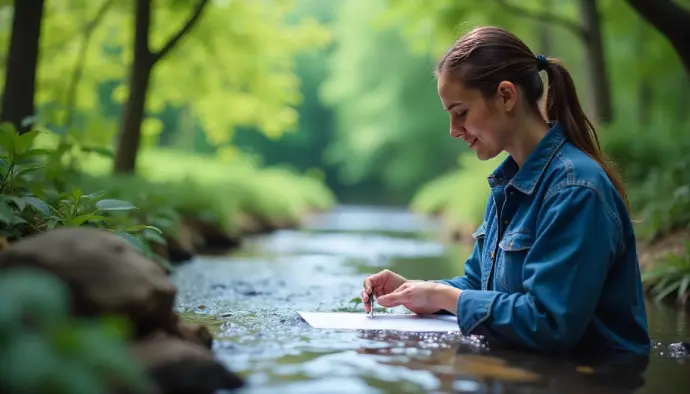Environmental and Water Engineering
• Practical learning through laboratory and field work, excursions, internships with industry and agencies.
• The program is research driven, offering opportunities to contribute to cutting‑edge projects on heavy metals, emerging contaminants, sustainable natural resources management, and climate resilience.
• The curriculum is internationally aligned with EU directives, BOKU University, and global best practices in environmental and water engineering.
• The program offers strong ties with employers in water utilities, environmental consultancies, and regulatory bodies ensure our graduates are career ready and highly employable.
For further information and application procedures, please visit the DENR website or contact the program coordinator at dame@ubt.edu.al
The Bachelor’s program (BSc.) in “Environmental and Water Engineering” is an interdisciplinary program offered by the Department of Environment and Natural Resources (DENR), Faculty of Agriculture and Environment (FAE) at the Agricultural University of Tirana (AUT).
This program combines core engineering principles with environmental science to prepare graduates for the sustainable management of water and natural resources, the mitigation of pollution, and the design of nature based and technical solutions to contemporary ecological challenges.
This program aims to:
• Deliver in-depth expertise in water treatment technologies, pollutant mobility and chemical dynamics, soil and water quality assessment, and ecosystem restoration.
• Develop multidisciplinary problem-solvers capable of integrating engineering design, environmental monitoring, and policy analysis.
• Equip graduates with knowledge in planning and management of water system, wastewater treatment, and stormwater systems in compliance with international and EU standards..
• Advance knowledge of heavy metals, emerging contaminants and pesticide behavior to inform risk assessment and evidence based environmental policy.
• Cultivate research and innovation skills in developing nature-based solutions, green infrastructure, and circular economy approaches to natural resource management.
Graduates of the BSc. in “Environmental and Water Engineering” will be able to:
• Plan and manage water supply networks, urban water systems, irrigation infrastructures, and wastewater treatment facilities.
• Conduct environmental and social impact assessments (EIA/ESIA) and develop environmental management plans (EMP) to mitigate negative impacts.
• Apply hydrological and hydraulic principles to analyze surface and groundwater systems for sustainable resource use.
• Design and implement nature based and technical solutions-such as treatment wetlands, green infrastructure, and pollutant remediation systems.
• Monitor and evaluate environmental parameters using modern techniques, sensor networks, and geospatial tools (GIS, remote sensing).
• Model environmental systems with computational tools to predict pollutant transport, water flows, and ecosystem responses.
• Ensure sustainable use and management of natural resources, implementing best practices to maintain ecosystem integrity and resource availability.
• Interpret and enforce environmental legislation, standards, and EU directives in project planning and implementation.
Graduates can pursue careers as:
• Environmental and Water Engineers in public sector, consulting companies, and private industry.
• Regulatory Specialists in governmental and international agencies (e.g., ministries of environment, water authorities, EU funded projects).
• Project Expert for infrastructure, restoration, and climate resilience initiatives.
• Research and Development Staff in universities, research institutes, and technology providers (e.g., sensor/IoT companies).
• Environmental Policy Advisors shaping legislation and strategic planning for sustainable development.
- 1st Year: Applied mathematics and statistic, physics, chemistry, introductory hydrology, geology, applied biology, fundamentals of the social sciences and GIS and remote sensing (60 ECTS).
- 2nd Year: Resource policy and public relations, scientific work, soil science, environmental and atmospheric pollution, ecology, process engineering, water treatment processes, planning of spatial resources, circular economy, fate of pollutants (60 ECTS).
- 3rd Year, Profile “Water Management”: Hydraulic and hydrology engineering, water monitoring methods, agrochemical pollution management, interdisciplinary project and excursions, general and aquatic ecology, river basin management, nature‑based solutions, plus thesis project (60 ECTS).
- 3rd Year, Profile “Natural Resources Management”: Land use and soil protection, environmental risk assessment and management, conservation biology, agrochemical pollution management, interdisciplinary project and excursions, biological resource and marine ecosystems, sustainable development and renewable energies, plus thesis project (60 ECTS).
• Natural Sciences (48 ECTS): physics, mathematics, chemistry, meteorology, botany, hydrology, geology and soil science, ecology, etc.
• Engineering & Technology (90 ECTS): water treatment technology, hydraulics, process engineering, environmental pollution control, environmental modelling, geospatial analysis, land and soil water management, planning of spatial resources, circular economy and technology, instrumentation, etc.
• Social, Economic & Policy Sciences (42 ECTS): fundamentals of environmental and resource management, social sciences, environmental economics, policy and regulation, project management, stakeholder engagement, etc.
